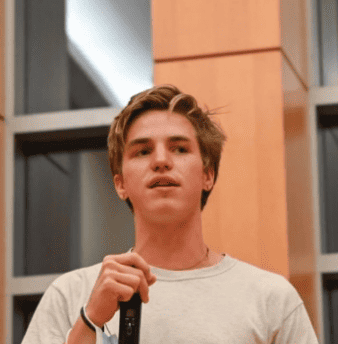Tait Ferguson, Special to The Denisonian—
If you’ve listened to a recent stump speech from President Adam Weinberg, you probably hear him mention that Denison is a place where you’ll have friends across the political spectrum. I agree whole-heartedly with President Weinberg’s sentiment that Denison should be a place where students are exposed to a variety of viewpoints and learn how to communicate across these differences.
Yet, anyone who watched the debate between the Denison Democratic Socialists of America and the Denison Libertarians is likely feeling much more cynical about the President’s call to action. Instead of being a constructive conversation where students debate, listen, and learn, the “debate” was dominated by Yik-Yak one-liners. Don’t get me wrong, I am excited to see an effort to actually have moderated partisan dialogues across differences, but students still lack a motivation to build healthy and constructive spaces for partisan disagreements that will lead to a more informed and community-focused campus.
One of the most important roles of a college education is to expose students to a variety of opinions and foster spaces where they can listen and develop informed viewpoints. Not to mention, dialogue across differences can help build empathy, which research has shown is the most important skill for fostering innovation, engagement, and inclusivity among leaders and teams (Brower 2021).
The Lisska Center, CLIC, and DU Votes have worked for years to try and make this vision a concrete reality on campus, but students must step up to the plate. Students need to take the initiative to help build constructive spaces to have partisan conversations, be willing to actively listen to their peers, and not be afraid to alter (or completely change) ideas they came to Denison believing. Two changes are essential if Denison students are to live up to President Weinberg’s charge.
First, Students should join (and lead) more partisan organizations on campus. Currently, partisan groups on campus have virtually no visibility, and don’t do enough to engage the campus in critical issues. We need spaces on campus where students can come to engage in a wide variety of partisan ideas and solutions. Importantly, partisan organizations offer Denisonians the opportunity to learn from perspectives different from their own, often from friends, peers, or co-workers. With a variety of well-attended and well-led partisan organizations, students will be able to engage with the nuances of political ideologies and develop political ideologies that they can be confident in.
Moreover, the Denison Libertarians, College Democrats, and College Republicans barely run any campus events that engage students in dialogic partisan conversations, yet the clubs received over a combined $56,000 from 2022-2023 DCGA club funds. If their job is to encourage a healthy and consistent partisan dialogue, and they have the money to do it, why aren’t there a wealth of events doing just that?
Second, where spaces for partisan conversation do exist, students need to be committed to practicing empathy and listening. This class of 2026’s August Orientation included a Braver Angles debate on free speech as a stellar example of healthy dialogue on difficult issues. Students and faculty gave competing, but informed and respectful perspectives on a heated issue. Partisan organizations on campus should aim to create opportunities for leaders to present a variety of viewpoints where students can openly engage. Importantly, students engaging in conversations on partisan issues should come to the space ready to learn from their peers. This doesn’t mean you must always change your mind, but you should be willing to hear the other side.


Alison Hardy
I would love some examples of “by Yik-Yak one-liners”